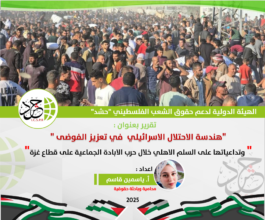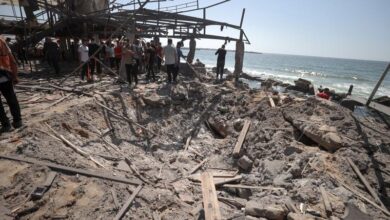
The International Commission (ICSPR) Issues a Report Titled “Forced Displacement of Palestinians Genocide as a Tool”
Date: April 27, 2025
Press Release
The International Commission (ICSPR) Issues a Report Titled: “Forced Displacement of Palestinians: Genocide as a Tool”
The International Commission to Support Palestinian People’s Rights (ICSPR), through its Department of Research and Policy, has issued a comprehensive report titled: “Forced Displacement of Palestinians: Genocide as a Tool,” prepared by attorneys Rana Hdeib and Yasmin Qassem, in April 2025. The report addresses the Israeli practices aimed at forcibly displacing Palestinians, documenting the legal, humanitarian, and historical dimensions of these ongoing policies.
Introduction
The report affirms that the idea of displacing Palestinians is not a result of the war of October 7, 2023, nor of recent U.S. administration plans. Rather, it is a deeply rooted policy that predates the establishment and international recognition of the Israeli occupation state. Since its inception, the Zionist movement sought to create a Jewish-majority state at the expense of the Palestinian population, who constituted the majority and rightful owners of the land. The report discusses the historical attempts by the occupation to push Palestinians to leave their homeland under the guise of “voluntary migration,” which was, in essence, forced displacement, whether through transfer plans or through harsh living conditions that compelled Palestinians to flee.
The report highlights that displacement attempts escalated following the war of October 7, 2023, with public proposals emerging, such as the Israeli Intelligence Minister’s plan to displace Gaza’s residents to Sinai, alongside practical measures aimed at depopulating the Gaza Strip by attracting foreign nationals and facilitating the resettlement of Gazans abroad.
Definition of Forced Displacement
The report defines forced displacement as a systematic practice aimed at emptying areas of their indigenous populations, either through direct coercion and use of force or through indirect pressure, intimidation, and persecution. It explains that forced displacement constitutes a war crime, a crime against humanity, and an act of genocide under international law.
The report distinguishes between forced displacement, which occurs under coercion and persecution, and voluntary migration, which is an individual decision driven by economic or social reasons without direct threats. It emphasizes that the Palestinian people are among the most displaced populations in modern history, categorizing them into two main groups:
-
Palestinian refugees displaced in 1948 and 1967 to neighboring countries or other Palestinian areas.
-
Internally displaced persons who were forced to leave their homes within the occupied territories without crossing international borders.
The report notes that the mass internal displacement in Gaza after the 2023–2024 war cannot be considered spontaneous or voluntary, as Israel portrays it, but rather constitutes forced displacement resulting from systematic military policies that compelled residents to flee under the pressure of bombardment, starvation, and destruction, leading to over two million internally displaced persons facing dire humanitarian conditions.
Legal Framework of Forced Displacement
The report addresses the legal framework governing forced displacement under international law, emphasizing that such practices represent a flagrant violation of the Fourth Geneva Convention and the Rome Statute of the International Criminal Court, classifying them as crimes against humanity and war crimes.
The report reviews relevant legal provisions, such as:
-
Article 49 of the Fourth Geneva Convention, which prohibits the forcible transfer of protected persons.
-
Article 146, which mandates the prosecution of individuals responsible for grave breaches.
-
Article 7 of the Rome Statute, which defines forced displacement as a crime against humanity.
It also references the Universal Declaration of Human Rights, the International Covenant on Civil and Political Rights, and the Guiding Principles on Internal Displacement, which stress the prohibition of forced displacement except in extreme circumstances under international law.
The report asserts that the practices of the Israeli occupation during the genocide in Gaza in 2023 cannot be classified as emergency evacuation but as organized forced displacement, considering the absence of safe corridors, the direct targeting of civilians, and the systematic destruction of infrastructure — all holding the Israeli occupation criminally responsible for this crime.
Historical Context of Displacement
The report dedicates a section to the historical context of the forced displacement policy against Palestinians, showing that it has been a continuous strategy since the founding of the Zionist movement and remains ongoing through April 2025.
The report outlines key historical milestones in this policy, including:
-
The Nakba of 1948, during which approximately 750,000 Palestinians were forcibly displaced, hundreds of Palestinian villages were destroyed to prevent their return, and refugees were created in the West Bank, Gaza, and neighboring Arab countries. The Right of Return, enshrined in UN General Assembly Resolution 194, remains a central unresolved issue.
-
The 1967 Naksa, which triggered a new wave of displacement following Israel’s occupation of the West Bank, Gaza Strip, and East Jerusalem, displacing tens of thousands of Palestinians.
-
Subsequent displacement operations, such as the expulsion of Palestinians from areas including the Negev, Jordan Valley, and parts of Jerusalem, through settlement policies, demolitions, and land confiscations.
The report stresses that the most recent wave of displacement during the 2023–2024 genocide in Gaza fits within this long-standing historical pattern but represents one of the most dangerous stages due to the intensity, scale, and deliberate targeting of civilians and residential neighborhoods aimed at depopulating the territory.
Conclusion and Recommendations
The report concludes that the current events faced by Palestinians in the Gaza Strip represent the culmination of a policy of forced displacement, where genocide is employed as a tool to forcibly expel the population. It asserts that these policies constitute a grave violation of all principles of international humanitarian law and international human rights law.
The International Commission to Support Palestinian People’s Rights (ICSPR) calls upon the international community, including the United Nations and the International Criminal Court, to fulfill their legal and moral obligations by:
-
Recognizing that what is happening in Gaza is forced displacement and genocide.
-
Taking immediate action to hold Israeli occupation leaders accountable for their crimes.
-
Activating international protection mechanisms for Palestinians, including establishing independent international investigation committees.
-
Supporting efforts to enable Palestinian refugees and internally displaced persons to return to their homes in accordance with international legitimacy resolutions.
-
Enhancing urgent humanitarian support for the displaced and providing them with international protection.
The Commission concluded its report by stressing that the ongoing international silence regarding Israel’s continued crimes against Palestinians, particularly in the Gaza Strip, perpetuates a culture of impunity and encourages the occupation to continue its policies of forced displacement and crimes against humanity.





